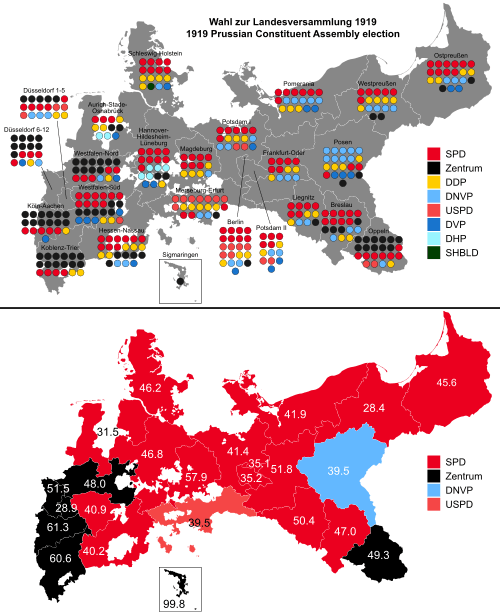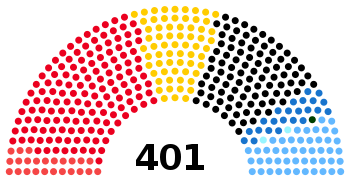1919 Prussian state election
State elections were held in the Free State of Prussia on 26 January 1919.[1] The elections were held a week after the elections to the federal National Assembly, and were the first elections of Prussian institutions held using proportional representation and with women's suffrage. The election was also the first truly free and fair Prussian election, as it was the first election held after the abolition of the Prussian three-class franchise, which greatly overrepresented wealthy landowners and disenfranchised lower classes.
| ||||||||||||||||||||||||||||||||||||||||||||||||||||||||||||||||
All 401 seats in the State Assembly 201 seats needed for a majority | ||||||||||||||||||||||||||||||||||||||||||||||||||||||||||||||||
|---|---|---|---|---|---|---|---|---|---|---|---|---|---|---|---|---|---|---|---|---|---|---|---|---|---|---|---|---|---|---|---|---|---|---|---|---|---|---|---|---|---|---|---|---|---|---|---|---|---|---|---|---|---|---|---|---|---|---|---|---|---|---|---|---|
| Turnout | 74.79% | |||||||||||||||||||||||||||||||||||||||||||||||||||||||||||||||
| ||||||||||||||||||||||||||||||||||||||||||||||||||||||||||||||||
 Top: results by constituency. Bottom: winning party in each constituency. | ||||||||||||||||||||||||||||||||||||||||||||||||||||||||||||||||
| ||||||||||||||||||||||||||||||||||||||||||||||||||||||||||||||||
The State Assembly (Landesversammlung) functioned as both a constituent assembly and legislature. The parties of the "Weimar Coalition", the Social Democratic Party (SPD), Centre Party (Zentrum), and German Democratic Party (DDP), won a sweeping majority. Together they won 74.8% of the votes cast.[2] SPD politician Paul Hirsch, who had been appointed Minister-President of Prussia in November 1918, continued in office, and was succeeded by Otto Braun in early 1920.
Results
 | ||||
| Party | Votes | % | Seats | |
|---|---|---|---|---|
| Social Democratic Party (SPD) | 6,278,291 | 36.38 | 145 | |
| Centre Party/Christian People's Party[lower-alpha 1] (Zentrum) | 3,834,953 | 22.22 | 93 | |
| German Democratic Party (DDP) | 2,796,359[lower-alpha 2] | 16.20 | 65 | |
| German National People's Party (DNVP) | 1,936,939[lower-alpha 3] | 11.22 | 48 | |
| Independent Social Democratic Party (USPD) | 1,280,803 | 7.42 | 24 | |
| German People's Party (DVP) | 981,665[lower-alpha 4] | 5.69 | 23 | |
| German-Hanoverian Party (DHP) | 84,975 | 0.49 | 2 | |
| Schleswig-Holstein Farmers and Farmworkers Democracy (SHBLD) | 61,565 | 0.36 | 1 | |
| Christian Social Party | 1.211 | 0.01 | 0 | |
| Protestant People's Party | 552 | 0.00 | 0 | |
| Social Reform Party | 31 | 0.00 | 0 | |
| Invalid/blank votes | [lower-alpha 5] | 0.37[lower-alpha 5] | – | |
| Total | 17,257,344[lower-alpha 5] | 100 | 401 | |
| Registered voters/turnout | [lower-alpha 5] | 74.79[lower-alpha 5] | – | |
| Gonschior.de | ||||
Results by constituency
| Constituency | SPD | Z | DDP | DNVP | USPD | DVP | DHP | SHBLD |
|---|---|---|---|---|---|---|---|---|
| 1. East Prussia | 45.6 | 11.4 | 17.1 | 14.4 | 3.6 | 7.8 | – | – |
| 2. West Prussia | 28.4 | 15.2 | 26.4 | 25.5 | 4.5 | – | – | – |
| 3. Berlin | 35.1 | 5.5 | 15.3 | 10.4 | 28.2 | 5.5 | – | – |
| 4. Potsdam I | 41.4 | 2.4 | 20.1 | 13.9 | 14.6 | 7.7 | – | – |
| 5. Potsdam II | 35.2 | 4.0 | 20.4 | 15.0 | 15.0 | 10.4 | – | – |
| 6. Frankfurt-Oder | 51.8 | 1.7 | 21.6 | 20.8 | 0.7 | 3.3 | – | – |
| 7. Pomerania | 41.9 | 0.6 | 19.3 | 26.6 | 1.4 | 10.2 | – | – |
| 8. Posen | 15.9 | 9.7 | 19.3 | 39.5 | – | 15.7 | – | – |
| 9. Breslau | 47.0 | 22.2 | 14.6 | 16.1 | 0.1 | – | – | – |
| 10. Oppeln | 29.7 | 49.3 | 5.5 | 7.4 | – | 8.2 | – | – |
| 11. Liegnitz | 50.4 | 9.7 | 25.7 | 14.1 | – | – | – | – |
| 12. Magdeburg | 57.9 | 1.7 | 23.8 | 9.9 | 3.3 | 3.3 | – | – |
| 13. Merseburg-Erfurt | 16.3 | 5.9 | 23.4 | 13.6 | 39.5 | 1.4 | – | – |
| 14. Schleswig-Holstein | 46.2 | 1.0 | 26.7 | 7.7 | 2.8 | 7.1 | – | 8.5 |
| 15. Aurich-Stade-Osnabrück | 31.5 | 18.2 | 18.9 | 4.3 | – | 9.7 | 17.5 | – |
| 16. Hannover-Hildesheim-Lüneburg | 46.8 | [lower-alpha 6] | 9.4 | 2.6 | 1.2 | 8.6 | 31.5 | – |
| 17. Münster-Minden-Kreis Schaumburg | 28.0 | 48.0 | 7.7 | 8.1 | 1.8 | 6.2 | – | – |
| 18. Arnsberg | 40.9 | 29.9 | 9.3 | [lower-alpha 7] | 4.6 | 15.2 | – | – |
| 19. Hesse-Nassau | 40.2 | 18.9 | 21.6 | 9.6 | 3.5 | 6.2 | – | – |
| 20. Cologne/Aachen | 25.0 | 61.3 | 7.4 | 2.9 | 3.4 | 0.0 | – | – |
| 21. Koblenz/Trier | 21.3 | 60.6 | 14.9 | 3.2 | – | [lower-alpha 8] | – | – |
| 22. Düsseldorf 1–5 | 27.2 | 28.9 | 11.2 | 15.4 | 17.3 | [lower-alpha 9] | – | – |
| 23. Düsseldorf 6–12 | 27.0 | 51.5 | 6.8 | 6.1 | – | 8.6 | – | – |
| 24. Sigmaringen[lower-alpha 10] | – | 99.8 | – | – | – | – | – | – |
Notes
- Zentrum used the name Christliche Volkspartei along with Zentrumspartei around this time.
- Including 111,663 votes in constituency #21 (Koblenz/Trier) for the list "German Democratic Party and German People's Party".
- Including 131,950 votes in constituency #22 (Düsseldorf 1–5) for the list "German National People's Party, German People's Party and National Association Essen".
- Including 164,687 votes in constituency #18 (Arnsberg) for the list "German People's Party and German National People's Party".
- Note: data is incomplete for Pomerania, Posen, the district of Merseburg and Schmalkalden, and Schleswig-Holstein. Accurate totals therefore cannot be given for registered voters, voter turnout, and valid/invalid votes.
- Zentrum ran a joint list with the DHP in constituency #16 (Hannover-Hildesheim-Lüneburg). Five DHP members and two Zentrum members were elected on this list.
- The DNVP ran on a joint list with the DVP in constituency #18 (Arnsberg). Four DVP members and no DNVP members were elected on this list.
- The DVP ran on a joint list with the DDP in constituency #21 (Koblenz/Trier). Two DDP members and no DVP members were elected on this list.
- The DVP ran on a joint list with the DNVP in constituency #22 (Düsseldorf 1–5). Three DNVP members and no DVP members were elected on this list.
- Zentrum was the only party that fielded a list in constituency #24 (Sigmaringen).
References
- Dieter Nohlen & Philip Stöver (2010) Elections in Europe: A data handbook, p762 ISBN 978-3-8329-5609-7
- Nohlen & Stöver, p776